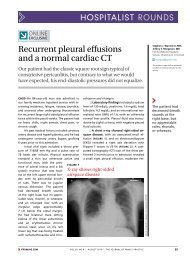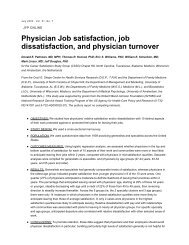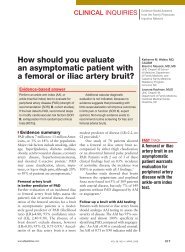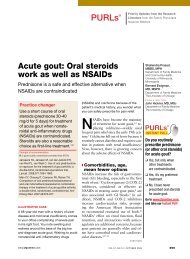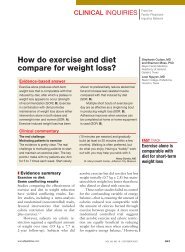Clinical Inquiries - The Journal of Family Practice
Clinical Inquiries - The Journal of Family Practice
Clinical Inquiries - The Journal of Family Practice
You also want an ePaper? Increase the reach of your titles
YUMPU automatically turns print PDFs into web optimized ePapers that Google loves.
2. Adams N, Sim J. An overview <strong>of</strong> fibromyalgia syndrome:<br />
mechanisms, differential diagnosis and treatment approaches.<br />
Physiotherapy 1998; 84:304–318.<br />
3. Buckelew SP, Conway R, Parker J, et al. Bi<strong>of</strong>eedback/relaxation<br />
training and exercise interventions for fibromyalgia:<br />
a prospective trial. Arthritis Care Res 1998; 11:196–209.<br />
4. Burckhardt CS, Mannerkorpi K, Hedenberg L, Bjelle A.<br />
A randomized, controlled clinical trial <strong>of</strong> education and<br />
physical training for women with fibromyalgia.<br />
J Rheumatol 1994; 21:714–720.<br />
5. Gowans SE, deHueck A, Voss S, Richardson M. A randomized,<br />
controlled trial <strong>of</strong> exercise and education for individuals<br />
with fibromyalgia. Arthritis Care Res 1999; 12:120–128.<br />
6. Keel PJ, Bodoky C, Gerhard U, Muller W. Comparison <strong>of</strong> integrated<br />
group therapy and group relaxation training for<br />
fibromyalgia. Clin J Pain 1998; 14:232–238.<br />
7. Vlaeyen JW, Teeken-Gruben NJ, Goossens ME, et al.<br />
Cognitive-educational treatment <strong>of</strong> fibromyalgia: a randomized<br />
clinical trial. I. <strong>Clinical</strong> effects. J Rheumatol 1996;<br />
23:1237–1245.<br />
8. Jones KD, Burckhardt CS, Clark SR, Bennett RM, Potempa<br />
KM. A randomized controlled trial <strong>of</strong> muscle strengthening<br />
versus flexibility training in fibromyalgia. J Rheumatol 2002;<br />
29:1041–1048.<br />
9. Kendall SA, Ekselius L, Gerdle B, Soren B, Bengtsson A.<br />
Feldenkrais intervention in fibromyalgia patients: A pilot<br />
study. J Musculoskeletal Pain 2001; 9:25–35.<br />
10. Karjalainen K, Malmivaara A, van Tulder M, et al.<br />
Multidisciplinary rehabilitation for fibromyalgia and musculoskeletal<br />
pain in working age adults. Cochrane Database<br />
Syst Rev 2000; (2):CD001984. Updated quarterly.<br />
11. Busch A, Schachter CL, Peloso PM, Bombardier C. Exercise<br />
for treating fibromyalgia syndrome. Cochrane Database Syst<br />
Rev 2002; (3):CD003786. Updated quarterly.<br />
12. Claus DJ. Fibromyalgia. In: Ruddy S, Harris ED Jr., Sledge<br />
CB, eds. Kelley’s Textbook <strong>of</strong> Rheumatology. 6th ed.<br />
Philadelphia, Pa: W.B. Saunders; 2001:417–427.<br />
13. Gilliland BC. Relapsing polychondritis and other arthritides.<br />
In: Braunwald E, Fauci AS, Kasper DL, Hauser SL, Longo<br />
DL, Jameson JL, eds. Harrison’s Principles <strong>of</strong> Internal<br />
Medicine. 15th ed. New York, NY: McGraw-Hill;<br />
2001:2005–2016.<br />
Do antiarrhythmics prevent<br />
sudden death in patients<br />
with heart failure?<br />
■ EVIDENCE-BASED ANSWER<br />
Beta-blockers (class II antiarrhythmics) reduce<br />
sudden death and total mortality in patients with<br />
heart failure (strength <strong>of</strong> recommendation [SOR]:<br />
A, based on systematic reviews <strong>of</strong> randomized<br />
controlled trials). Amiodarone (class III) may<br />
reduce sudden death in heart failure (SOR: B,<br />
extrapolation from randomized controlled trials),<br />
CLINICAL INQUIRIES<br />
Beta-blockers were well-tolerated,<br />
and improved other endpoints<br />
besides heart failure<br />
but evidence is weak that it reduces total mortality,<br />
and it has significant side effects. Class I and<br />
other class III antiarrhythmic agents appear<br />
cause an increase in mortality due to sudden<br />
death in heart failure (SOR: B, extrapolations<br />
from randomized controlled trials).<br />
■ EVIDENCE SUMMARY<br />
Antiarrhythmic agents have been studied in<br />
patients with heart failure because these persons<br />
have a high incidence <strong>of</strong> sudden death, presumably<br />
from ventricular arrhythmias. Although the<br />
implantable defibrillator is an alternative antiarrhythmic<br />
device that may be preferred for some<br />
patients, we restricted our review to pharmacologic<br />
antiarrhythmics.<br />
<strong>The</strong> beta-blockers bisoprolol, carvedilol, and<br />
metoprolol 1–3 were studied in large randomized<br />
controlled trials. <strong>The</strong> relative risk reduction<br />
(RRR) for sudden death ranged from 10% to 52%<br />
in the larger trials and 30% to 39% in meta-analyses.<br />
1–4 <strong>The</strong> absolute risk reduction (ARR) was<br />
about 2% to 3% per year for sudden death and 3%<br />
to 5% for total mortality (number needed to<br />
treat=20–33 per year).<br />
<strong>The</strong>se beta-blockers were well-tolerated, even<br />
in class IV New York Heart Association patients,<br />
and improved other endpoints. Although we<br />
cannot say whether the benefits are a class<br />
effect, they were seen with both beta-1 selective<br />
and nonselective agents.<br />
Amiodarone was studied in 2 large randomized<br />
controlled trials enrolling patients with<br />
heart failure, in trials that included patients<br />
with or without heart failure at high risk for sudden<br />
death (usually post-myocardial infarction or<br />
with complex ventricular arrhythmias), and in<br />
meta-analyses. 5–8 <strong>The</strong> largest randomized controlled<br />
trial in heart failure showed a significant<br />
ARR <strong>of</strong> 2.9% for sudden death, 5 but was unblind-<br />
CONTINUED<br />
SEPTEMBER 2003 / VOL 52, NO 9 · <strong>The</strong> <strong>Journal</strong> <strong>of</strong> <strong>Family</strong> <strong>Practice</strong> 719



